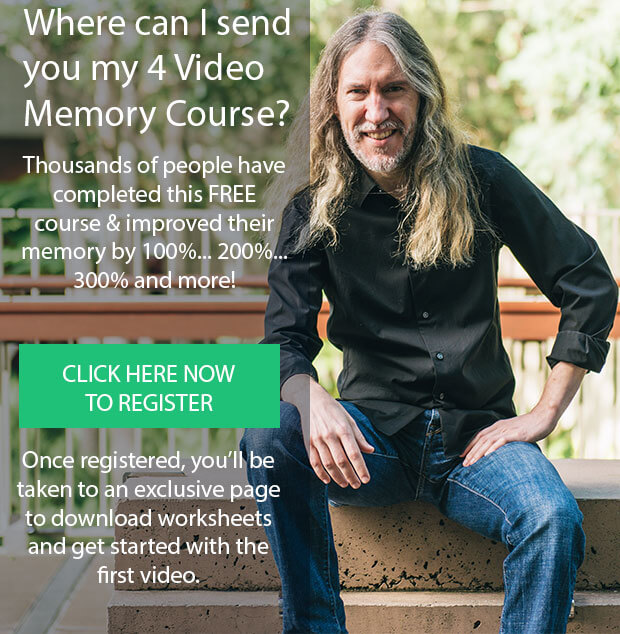 Are there any study tips that I’d kill to know if I were going back to school?
Are there any study tips that I’d kill to know if I were going back to school?
I get this question all the time.
And although I wouldn’t kill for anything, a few suggestions do come to mind…
Fewer pints of Guinness, for one thing (and I’ll explain exactly why).
More time in the library.
Perhaps even committing to another area of study altogether.
(Even if that might have lead to an entirely different career path.)
So with some reflection on the years since I’ve earned my B.A., two M.A.s, and a Ph.D., I’ve assembled 21 study tips for you.
Let’s jump in.
#1. Learn Memory Techniques Earlier
This is, without a doubt, my no. 1 criticism of my own learning career.
(Yes, even more than all those blurry post-study session happy hours!)
I wish I would have started learning memory techniques sooner.
Cruising altitude
We are all familiar with the expression “cruising altitude,” right?
Generally this is the point in the flight where the “seat-belt light” is turned off, you’re free to move about the cabin, and everything is smooth sailing.
What if I told you this cruising altitude was attainable…faster? All it takes is getting started. Seems like a no-brainer, doesn’t it?
If you commit to learning memory techniques sooner you’ll develop this intuition – knowing what to do, how to do it, and when.
The true roots of inspiration
Growing up, we all had that mother figure that just knew what we needed.
The decision to learn memory techniques will serve you and reward you tenfold.
You’ll be able to:
- Adopt them on the fly because you’re always prepared.
- Learn more, and more precisely because information will have a place to be stored.
- Avoid decision anxiety because you will know which memory techniques work for you.
As Brian Tracy once said, “The hardest part of any important task is getting started on it in the first place. Once you actually begin work on a valuable task, you seem to be naturally motivated to continue.”
Start there, and I promise, you won’t regret it.
#2. Keep a Memory Journal
What do you do to remember those important points from a professor’s lecture?
Surely you don’t just sit in the classroom and hope you remember what was discussed that day come finals week. You take notes don’t you? Of course you do!
Well, why aren’t you taking notes in all areas of your life? Valuable information can slip away too easily if it’s not recorded. It’s such a simple fix, taking minimal time to physically write things down.
To learn faster, to really learn the information you need to know, you must sort through the “junk.”
The ultimate “decision tree”
This means deciding:
- What must be captured in your memory
- What you can legitimately reduce
- What will relieve cognitive load
- What you can let go of completely
In other words, prioritize.
I’ve found using The Freedom Journal as my Memory Journal works great for helping me discover and determine the big levers I need to be focusing on.
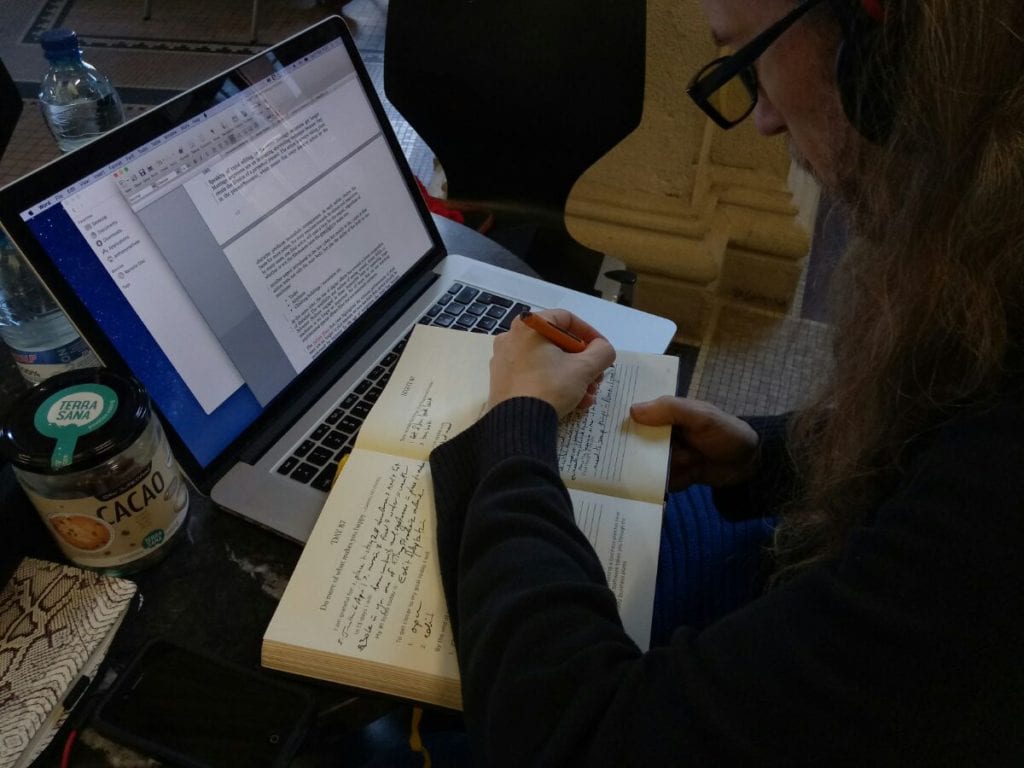
Anthony Metivier using the Freedom Journal
If you put in the work of creating and maintaining a Memory Journal, here’s the best part:
Flipping back through the pages will show you not only how far you’ve come, but where you can make improvements.
#3. Double Down on Memory Palaces
Excuse the casino speak, but I would undoubtedly double down on the number of memory palaces I created.
Let me be clear, I made a ton, but when I think about the benefits of memory palaces I know I should have created a lot more. By creating memory palaces you’ll unlock your:
- Spatial memory
- Autobiographical memory
- Episodic memory
- Procedural memory
- Figural memory
- Semantic memory
I know creating Memory Palaces may be overwhelming. I know you may not know where to start, but this is something that you just need to dive in and try.
My free course will guide you, step-by-step, in this creation process:
#4. Complete a 00-99 P.A.O. sooner
This is another one of those special memory techniques that my best advice is to just dive in and get it done.
Think about what a sizzling fast memory would be like, learning as fast as you want to.
That guiding vision, that inspiration, is possible when you have a P.A.O. (Person Action Object System) in place.
If you want guidance in creating one, check out How to Memorize Math, Numbers, Simple Arithmetic & Equations.
In brief:
- Start with the Memory Palace.
- Learn the Major Method.
- Then use the Memory Palace and the Major together to complete your PAO.
Simply put:
If numbers are involved in how you need to study fast, this number-memorization skill is essential.
Avoid perfectionism
Your first P.A.O. doesn’t have to be perfect the first time. Mine wasn’t.
In fact, I still make changes to mine. It is in a constant state of flow, of refinement.
One step at a time forward…sometimes sideways to tweak your P.A.O. You’re always moving towards your goal if you try to be. As long as you’re putting forth the effort you will always be progressing.
#5. Read even more memory improvement books
Understand this:
The more you know, the more you can know.
The more you expose yourself to literature, you will get the benefit of the primacy effect, the recency effect, and serial positioning effect.
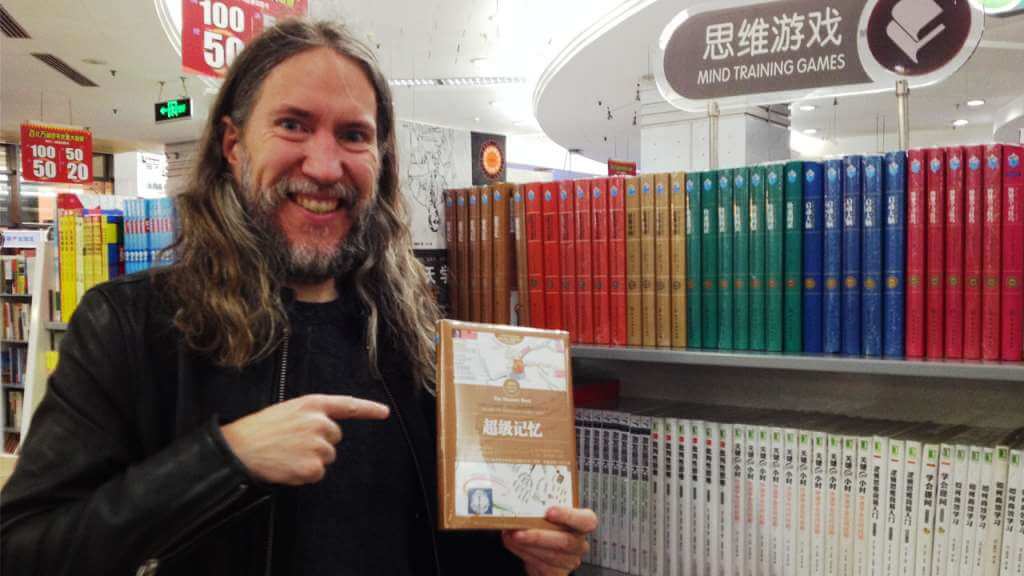
Anthony Metivier with a Chinese translation of a Tony Buzan book
Continually returning to a wealth of information, that repetition makes a huge difference in learning.
There is almost an infinite amount of memory literature on the market these days (including some great information from not-so-great teachers).
Patience is the key
My advice:
- Cast a wide net
- Use discernment to find what’s good for you
- Be open to a variety of writing and teaching styles
- Always continue to invest in your education
You will read more critically to retain information, and develop patience by reading a wide variety of literature from the memory tradition.
In short, read as much as you can.
#6. Teach memory techniques sooner
This goes for any profession. The more you want to learn something, the sooner you need to teach it.
Why?
You’ll learn what you seek to teach better because you’ll see where your understanding is lacking.
Plus, you’ll see where your ability to effectively enunciate and describe the information is lacking.
The science of feedback loops in learning
Then, you’ll figure out how to improve in real time as you receive feedback.
There’s even a name for this, the protégé effect.
The most important science in the article is this:
“Researchers have found that students enlisted to tutor others work harder to understand the material, recall it more accurately, and apply it more effectively…[These students] score higher on test than pupils learning for their own sake.
[Studies have shown] that first-born children are more intelligent than their later-born brothers and sisters…contributing their higher IQs result from the time they spend showing their younger siblings the ropes.”
The Roman philosopher Seneca said:
“While we teach, we learn.”
Now that this ancient wisdom has been proven by science, why not apply it in your own learning journey?
#7. Keep up card memorization practice
I took a break from my card memorization practice too soon in my educational career, and I know I would have learned much, much sooner incorporating this as a daily practice.
https://www.youtube.com/watch?v=d2E5RlvpmlI
I found many, many benefits to card practice once I returned to routine practice. You will learn to:
- Deal with multiple levels of information at the same time.
- Deal with information that is repetitive and similar, yet still distinguish it.
- Deal with long sequences of information along well-crafted Memory Palace journeys
#8. Language learning
From complicated formulas and symbols, to mathematical equations everything is language based.
The sooner you learn how to memorize words and phrases, the better you will build your skills for learning any information because any information you encode into memory palaces will be in words and phrases.
Languages = connections
Learning language gives you more sounds to work with. A greater range of sounds gives you the ability to work with abstract and concrete examples more easily. You mental dexterity will increase as well.
But this goes beyond you…
Just as teaching others accelerates your learning, learning a language and being in contact with more people sooner is a powerful tool to increase your learning speed.
Take advantage of those connections you build with others, because people are one of your greatest assets with memory work.
#9. Read WAY more history
Whenever you are using memory techniques you are using information that already exists in your head.
Put it this way:
The more information that you have already in your head, the more you’re able to use it in your memory encoding, using mnemonics.
Makes sense, right?
The more that those are real, substantial people, then the more real and prominent they’re going to be in your mind.
Even better:
This knowledge will be more accessible. Raw accessibility will reduce the cognitive load on your mind because you’re working from the real instead of wrangling with the imaginary.
Off the deep end with history
Reading history gives you a greater pool to draw from in your Magnetic Imagery. This, in turn, increases your ability to learn faster.
No matter the subject – choose something that interests you – and get your nose in a book about it.
Heck, I even read while walking just to make good use of the time:

Walking and reading in Denmark
I know it may seem counter-intuitive to add another “to-do” to your list, but think of the long-game.
There may even be unusual ways to complete note taking on the fly too. (Not to mention creating and using impromptu Memory Palaces)
All these steps are beneficial to your overall brain health, not just accelerated learning (though it is something to desire).
#10. Do more leadership/community work
Leadership is a huge skill. You can read people better, seeing their strengths and where they need support better.
Developing your qualities as a great leader and expert in your field, partnered with the idea of teaching, with help you learn more, more quickly.
Everything leads back to the Primacy and Recency effect.
The more you are continually coming across the topic, the deeper it will get into your memory.
Learn the natural way
This truly makes learning natural.
Plus, in-depth conversations will occur in these group settings. You will be effortlessly immersed in your topic so that you are continuously learning without even realizing it.
Easy peasy, no?
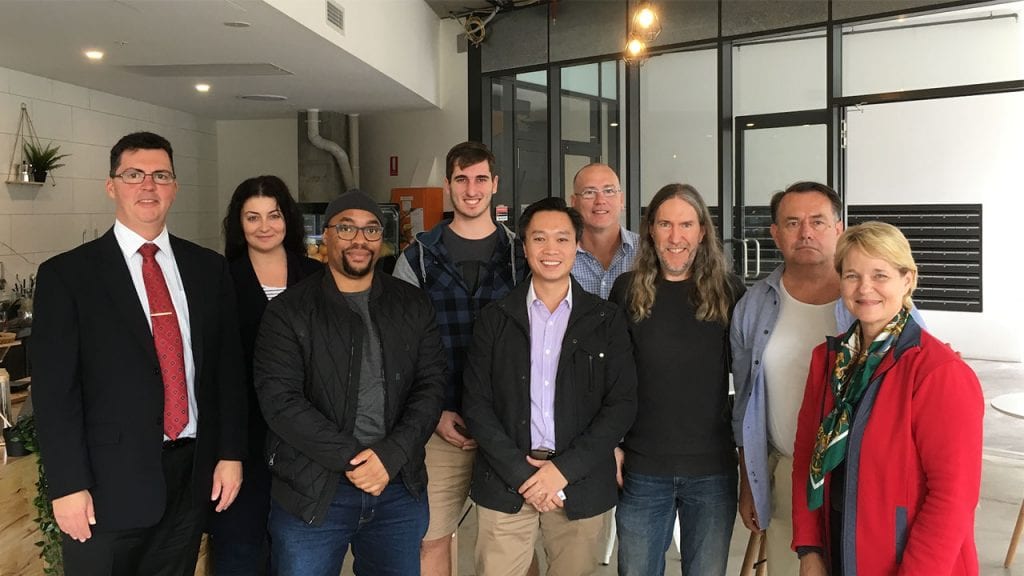
Helping some local entrepreneurs use Thinkific in Brisbane
#11. Apply for more scholarships
Though I received some great scholarships, doubling down on the amount I applied for is another thing I would do, without questioning, if returning to university.
I would do whatever it took to apply for more, and there’s a number of reasons why:
- Alleviating money worries frees you to “worry” about the future.
- Concentrating on your education instead of whether you can afford rent and tuition creates a more powerful resume.
- You’ll improve your application skills.
- Not only will practice create a better application essay, but your collection of reference letters will grow. You’ll extol your own great qualities more eloquently, but so will others.
It’s amazing what a little positive mental attitude and encouragement from others can do to transform your life.
#12. Invest in more training
There is so much more you can learn by supplementing the core subjects you’re learning.
You can learn so much more by applying what you’re learning in other areas.
You can also learn more about areas you’re already expert in. That’s why I attended a ThinkBuzan memory training, after all.
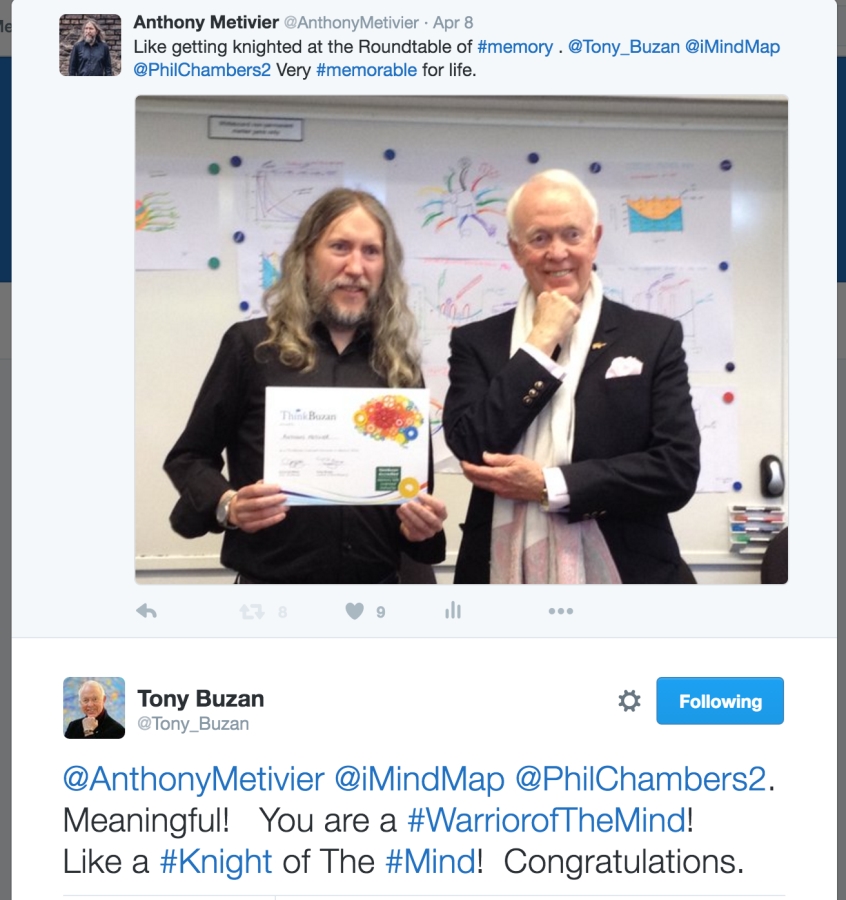
Anthony Metivier with Tony Buzan
Whether its CPR certification, martial arts training (those were just a few of my “should haves” when I think about things I should have learned sooner), a combination of short-term certifications and long-term training can be beneficial to developing learning skills.
They don’t have to be related to what you are studying per se, but will be beneficial if they were.
For example, I know I would dive into memory training a lot sooner had I realized the impact it would make on my life in the future.
Whatever you’re learning, find ways to apply it to other disciplines for maximum return.
#13. Get a writing mentor
Look:
Your goal here is not to become the next William Shakespeare, Charles Dickens, or Jane Austen (though I’m sure none of us would mind the accolades). It’s simply to improve your writing skills.
The best way to do that is by having a writing mentor.
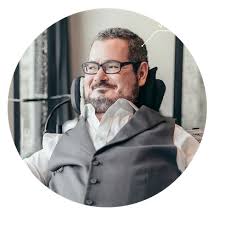
Jon Morrow of SmartBlogger.com and Unstoppable.me
My main writing mentor for this blog is Jon Morrow. If you compare his life lessons post to my life mistakes post, you’ll see why he’s considered the King of Blogging.
Free writing mentors are everywhere
But if you can’t afford a mentor, here are some suggestions:
- Have a graduate English student look at your writing
- Join a writing club
- Find online people for whom writing is more than just their passion, but also the kind of career you want to experience
This focus will help you find people who genuinely care for the end product. Their suggestions can lead to greater ways of packaging ideas, and better mental organization, and, in turn, greater powers of expression.
You can improve the world with your words and should strive to do so in every sentence.
#14. Hire a proofreader/editor
To further improve your writing skills, not only is a mentor a great asset, but a proofreader or editor as well.
This doesn’t necessarily mean hiring, or exchanging money for their services.
This can also be a great chance to peer mentor with others.
Exchange writing, give each other feedback on clarity, grammar, sentence, structure, etc.
I did this a lot in university – just not nearly enough.
Hiring is worth it
And if I were to do it again, I’d just hire someone for help.
After all, writing my dissertation twice… really sucked.
The question is… why is this a study tip?
- If you have an editor of any kind work with your writing, you’ll save time – time that can be applied to more studying.
- You’ll study what your writing looks like after it has been improved.
Both of these outcomes are incredible.
#15. Write non-fiction sooner
While I wrote a lot of fiction while in university, I didn’t write nearly enough non-fiction.
If you are already honing your writing skills with the help of a writing mentor and proofing/editing, the writing process itself can be beneficial to accelerate your learning.
With nonfiction you are putting in the work of research, through reading, and, many times, interviews – conversations about your topic, as discussed above, create an atmosphere of immersive study.
Again, this sounds a bit off topic when it comes to study advice, but it really isn’t. Practicing different kinds of writing directly amounts to studying those kinds of writing.
#16. Research more before following medical advice
This is something that may be hard to hear, but sometimes doctors are wrong.
It’s the brutal truth, though.

And if you’ve ever sought out a second opinion when you felt a diagnosis or treatment option was incorrect, you know it.
In fact, in Principles, Ray Dalio shares a frightening story about how he avoided a completely unnecessary removal of his throat by getting multiple medical opinions.
Oftentimes, as a college student you may not feel like you have the means or the time to seek out that second opinion.
Advocate for your own health
Think of it this way:
What could be more important than advocating for your own health?
I’ve shared my Bipolar memory adventures before, and still think I would have been better off getting a second opinion. I just didn’t know that I could or even should have sought it out.
Double check the advice you are given against medical and scientific literature.
Do your due diligence
Doing your own due diligence before following the advice of a medical professional can save you time, stress, and money, leaving you free to concentrate on your education.
This is another example of an obstacle that can be prevented easily, with care on your part.
It’s also another area that will give you practice in the kinds of study tips that can save your life.
#17. Move to another country sooner
Moving to another country, for even a short period of time (studying abroad for a semester, for example) is a great tool to help you learn faster.
There are numerous benefits, including:
- Learning another language
- Exposure to many different people, giving you the opportunity to learn multiple topics through experience with them
- Unlocking parts of your brain
- Inspiration for building more Memory Palaces
- Your numeracy skills will improve by dealing with different currencies and banking systems
Avoid the “some day” trap
Many people toy with the idea of starting a new life by reinventing themselves in a foreign country.

My favorite Berlin Memory Palace
But they see this as a “someday” dream.
Don’t do that. If you think of the practical reasons and benefits to a “big move” you’ll just start packing.
And the research you do along the way will build your study skills and give you the adventure of a lifetime.
(I saw this as a person who has lived in 4 countries and visited over 30).
#18. Be clearer about my purpose sooner.
Having a big vision to pull you through mundane tasks is the key.
Get clear about your goals and what you seek to achieve, and you will have the motivation to “power through” all the steps we’ve discussed.
If you know what you want to do, if you have clarity in purpose, you will put forth the effort to make your vision a reality.
#19. Diet, sleep, fitness, relationships
University is the time when many young people are “on their own” for the first time.
Students are figuring out their newfound freedom, and oftentimes this is an experiment in self-control.
Mental garbage is a barrier to learning faster, and is a result of not eating well, sleeping well, and engaging in, sometimes, toxic relationships.
Everything consumes
Understand this critical point:
Your brain is an energy consumption device. It’s consuming energy.
A great relationship can fuel it with energy.
A bad relationship can rob it of energy.
Remedy this by setting simple goals about the kinds of relationships you want.
The big picture
Remember that “big picture” vision we just talked about? From friendships to romance, and stick to this vision. Your energy will flow properly, and not hinder your ability to learn.
Otherwise, your study time will be chewed up on searching for a new or replacement mate. And that can seriously mess with your focus.
#20. Meditation for Better Memory
I had many, many opportunities to meditate, but I didn’t start my practice soon enough.
I would have began my practice earlier had I realized one important, yet simple fact:
There are multiple kinds of meditation.

Walking meditation works too!
For years, I imagined it as purely mental, or sitting just to sit.
But meditation is much more than a mental activity.
No matter the form, they all help with mental organization, concentration and focus.
Focus is a fact
Obviously, the better you are able to focus on information. The better you can focus on the things that matter in life, you do not get caught up in all the little things that don’t.
Explore the different types to find what works best for you, be it mindfulness meditation, transcendental meditation, or guided meditation, among others. Experiment to find out what works best for you.
#21. Cut out the booze
Yes, you read that correctly, and, no, it’s not a typo.
Alcohol is a brain killer.
I’m not going to preach about it any further than sharing my story.
I drank like a fish in university and it was almost certainly the true cause of my many depressions.
These horrible mental states interrupted my ability to focus, concentrate and remember.
Sure, memory techniques helped me get through. In fact, I used to flaunt the fact that I could remember names and do memory-related magic stunts while completely inebriated. All that sounds foolish to me now given the price I’ve paid.
How to avoid mental and physical misery as a student
If I had only been smart enough to eliminate alcohol in my life a decade sooner, I would have saved myself a ton of mental agony and physical pain.
All that misery?
It caused serious personal conflicts too, which on top of everything else, interrupted by ability to learn as quickly and thoroughly as I wanted.
If I had a time machine, I’d slap myself silly for inviting so much chaos into my life!
Short And Sweet Final Thoughts
Does any of this make sense to you?
If so, here’s how to get started:
Begin by incorporating one or two of these techniques into your routine. Then gradually expand.
You will find that with each new addition or removal I’ve suggested on this page that your learning, over time, has accelerated.
You will remember more, much faster. So much so that you’ll be able to enjoy much more of life, all guilt-free, all as a reward for a job well done.
From The Podcast
Anthony Metivier's Magnetic Memory Method Podcast
The Magnetic Memory Method Podcast is your portal to creating Memory Palaces and using mnemonics for memorizing foreign language vocabulary (and a lot of other precious information too). Hosted by Anthony Metivier, the founder of the Magnetic Memory Method, a systematic, 21st Century approach to memorizing foreign language vocabulary in a way that is easy, elegant, effective and fun.Join Podchaser to...
- Rate podcasts and episodes
- Follow podcasts and creators
- Create podcast and episode lists
- & much more
Episode Tags
Claim and edit this page to your liking.
Unlock more with Podchaser Pro
- Audience Insights
- Contact Information
- Demographics
- Charts
- Sponsor History
- and More!

- Account
- Register
- Log In
- Find Friends
- Resources
- Help Center
- Blog
- API
Podchaser is the ultimate destination for podcast data, search, and discovery. Learn More
- © 2024 Podchaser, Inc.
- Privacy Policy
- Terms of Service
- Contact Us

